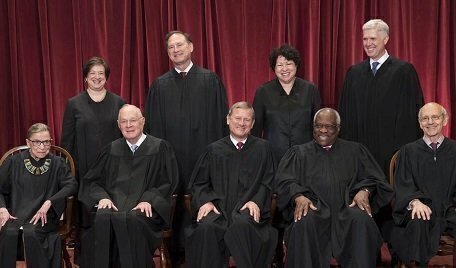In a 5-4 decision, the Supreme Court said on Monday that employees who agreed to individual arbitration in employer disputes can’t waive that process to join class-action lawsuits.
 The arguments in Epic Systems v. Lewis took place last fall and there were expectations the Court’s conservative wing would find that the Arbitration Act prevented the employees from extending their arbitration claims into federal lawsuits. The Court’s decision effectively overturns a National Labor Relations Board ruling from 2012 that allowed employees to go to federal court as a class under certain circumstances.
The arguments in Epic Systems v. Lewis took place last fall and there were expectations the Court’s conservative wing would find that the Arbitration Act prevented the employees from extending their arbitration claims into federal lawsuits. The Court’s decision effectively overturns a National Labor Relations Board ruling from 2012 that allowed employees to go to federal court as a class under certain circumstances.
“Should employees and employers be allowed to agree that any disputes between them will be resolved through one-on-one arbitration? Or should employees always be permitted to bring their claims in class or collective actions, no matter what they agreed with their employers?” asked Justice Neil Gorsuch in the majority opinion.
‘As a matter of law the answer is clear. In the Federal Arbitration Act, Congress has instructed federal courts to enforce arbitration agreements according to their terms—including terms providing for individualized proceedings,” Gorsuch said.
“The policy may be debatable but the law is clear: Congress has instructed that arbitration agreements like those before us must be enforced as written,” he concluded, noting that Congress could always amend its statutes to allow class-action lawsuits in those situations.
Justice Ruth Bader Ginsburg’s dissent – which she read from the Court’s bench – was longer than the majority opinion.
“The question presented: Does the Federal Arbitration Act (Arbitration Act or FAA) … permit employers to insist that their employees, whenever seeking redress for commonly experienced wage loss, go it alone, never mind the right secured to employees by the National Labor Relations Act (NLRA )… ‘to engage in . . . concerted activities’ for their ‘mutual aid or protection”? The answer should be a resounding ‘No,’” Ginsburg said.
Ginsburg also said the majority decision was “egregiously wrong.”
“The edict that employees with wage and hours claims may seek relief only one-by-one does not come from Congress. It is the result of take-it-or-leave-it labor contracts harking back to the type called ‘yellow dog,’ and of the readiness of this Court to enforce those unbargained-for agreements,” she concluded. (A yellow-dog contract is a pact where an employee agrees to not join a union and they are generally considered as illegal today.)
Scott Bomboy is the editor in chief of the National Constitution Center.







